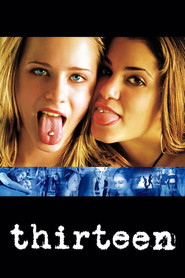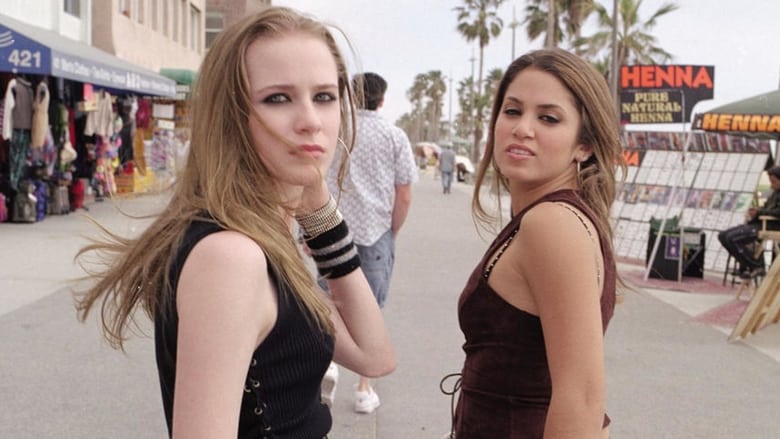“Thirteen” (2003) is a raw, visceral and unflinching coming-of-age drama. It delves into the tumultuous world of adolescence, depicting the self-destruction and rebellion of two teenage girls. As they spiral down a dark path, the film explores themes of identity, peer pressure, and the consequences of choices made at such a vulnerable age. With impeccable performances from its young cast, “Thirteen” invites viewers on an intense rollercoaster ride through the mishaps and trials of adolescence, ultimately leaving an indelible mark on their perceptions.

CLICK HERE⭳⭳⭳👉🏼_Watch Thirteen 2003 English Subtitles_
Review
In the world of cinema, certain films have the power to captivate us, challenge our assumptions, and force us to confront uncomfortable truths. One such film is “Thirteen,” a gritty and raw portrayal of adolescence that holds a mirror up to society’s deepest anxieties. Directed by Catherine Hardwicke and co-written by actress Nikki Reed, who drew inspiration from her own experiences, “Thirteen” delves into the tumultuous journey of Tracy (Evan Rachel Wood), a thirteen-year-old girl whose life takes a drastic turn when she befriends the rebellious Evie (Nikki Reed).
The storyline of “Thirteen” is both hauntingly authentic and deeply unsettling. As we follow Tracy’s descent into rebellion, drug abuse, self-mutilation, and promiscuity, it becomes clear that this is not your typical coming-of-age tale. The plot forces us to confront uncomfortable truths about the pressures faced by young girls in today’s society. It bravely explores themes of peer influence, parental neglect, and the damaging effects of societal expectations on young minds.
Indeed, based on actual events witnessed by Nikki Reed during her teenage years, “Thirteen” stands as a stark reminder that Hollywood isn’t always glossy escapism. The fact that this film drew from real-life experiences lends it an authenticity that hits close to home for many viewers. It serves as a stark wake-up call for parents struggling to navigate the treacherous waters of raising teenagers.
The performances in “Thirteen” are nothing short of extraordinary. Evan Rachel Wood delivers a truly fearless portrayal of Tracy’s journey from innocence to rebellion. Her ability to convey both vulnerability and strength is both captivating and heart-wrenching. Opposite her is Nikki Reed herself as Evie; her performance radiates with a seductive allure that draws viewers into her world while simultaneously repelling them.
One cannot discuss “Thirteen” without mentioning its powerful and thought-provoking dialogue. The screenplay is peppered with biting truths and poignant observations about adolescence. One particular quote from the film that lingers long after the credits roll is Tracy’s poignant reflection: “Sometimes I wish I could just sleep until I was eighteen and skip all this crap, high school and everything, just skip it.” It articulates the pain and confusion felt by so many young people navigating the complex landscape of adolescence.
The film’s low budget actually works in its favor, allowing it to feel more raw and authentic. It eschews Hollywood’s glossy sheen, opting for a handheld style that adds an air of immediacy to the story. The gritty cinematography captures the chaos and intensity of Tracy’s world, while the use of natural lighting enhances its realism.
Despite its lack of commercial success upon release, “Thirteen” garnered critical acclaim and has since gained a devoted following. Its powerful exploration of themes like sexuality, addiction, self-harm, and dysfunctional families struck a chord with audiences seeking a deeper understanding of these issues. In many ways, “Thirteen” was ahead of its time, serving as a precursor to modern conversations surrounding mental health and teenage struggles.
The film also received numerous awards recognizing its achievements. Evan Rachel Wood’s breakthrough performance earned her accolades for Best Actress at both the Cannes Film Festival and Satellite Awards. Nikki Reed’s co-writing efforts were applauded with nominations for Best Original Screenplay at the Independent Spirit Awards.
What truly sets “Thirteen” apart is its masterful editing. The fast-paced cuts capture the whirlwind emotions experienced by Tracy as she careens from one experience to another. It adds an unsettling energy to the film that keeps viewers on edge, mirroring Tracy’s own state of mind.
While “Thirteen” opened doors for discussions surrounding important issues faced by teenagers, it was not exempt from criticism. Some argued that the film sensationalized teenage rebellion and contributed to harmful stereotypes. However, the film’s ability to spark these conversations is a testament to its power and influence.
In the realm of soundtracks, “Thirteen” boasts a selection of songs that perfectly encapsulate the mood of the film. Artists like Avril Lavigne, Fefe Dobson, and The Distillers provide an angsty backdrop that amplifies Tracy’s emotions and adds depth to the story.
Looking back on “Thirteen,” it remains a groundbreaking film that fearlessly confronts societal taboos surrounding adolescence. Its impact on cinema is undeniable. It pushed boundaries and forced audiences to reevaluate their perceptions of teenage rebellion and the challenges faced by young girls in today’s world.
The legacy of “Thirteen” lies not only in its powerful storytelling but also in its ability to initiate meaningful discussions about important issues. It serves as a reminder that beneath the glitz and glamour of Hollywood, there are stories waiting to be told that can challenge our assumptions, provoke thought, and spark change. “Thirteen” is a film that will continue to resonate with viewers for generations to come, reminding us all of the power of cinema to illuminate our shared human experience.
As Malcolm Gladwell often does with his writing, “Thirteen” forces us to reflect on our own lives and society as a whole. It holds up a mirror that may reveal uncomfortable truths, yet in doing so, it ultimately empowers us to make a difference. And perhaps this is what makes “Thirteen” so profoundly impactful – its ability to generate dialogue, inspire change, and shed light on the complexities of adolescence like no other film has before or since.
Technical Data

- Release : 2003-08-20
- Runtime : 100
- Genre : Drama
- Cast : Evan Rachel Wood as Tracy Freeland, Nikki Reed as Evie Zamora, Holly Hunter as Melanie Freeland, Brady Corbet as Mason Freeland, Jeremy Sisto as Brady
- Crew : Lance Brown as Sound Re-Recording Mixer, Holly Hunter as Executive Producer, Tim Bevan as Executive Producer, Eric Fellner as Executive Producer, Elliot Davis as Director of Photography
- Revenue : 0
- Budget : $2,000,000
- Company : Sound for Film, Working Title Films, Antidote Films
- Popularity : 21.495
- Summary : Tracy is a normal 13-year-old trying to make it in school. After befriending the most popular girl at school, Evie, Tracy’s world is turned upside down when Evie introduces her to a world of sex, drugs and cash. But it isn’t long before Tracy’s new world and attitude finally takes a toll on her, her family, and old friends.
- Tagline : It’s happening so fast.
